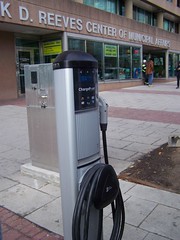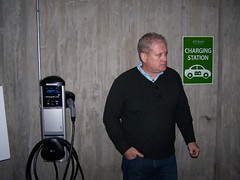Electric car charging equipment installed at 425 Massachusetts Ave. NW
Last week there was a press conference at the apartment building at 425 Massachusetts Avenue NW, heralding their addition of an electric car charging station to the "amenities" available to the residents there. It appears that this is the first such charging station in a residential building parking garage in the area.
The building is owned by Equity Residential, a national company. This is the first building in the DC metropolitan area that they've installed electric car charging infrastructure, in association with Car Charging Inc. .
Equity believes that in urban, high demographic, high rent areas that there will be demand for this service. They are working to add this amenity to properties they own in Boston, Seattle, Bellevue, Washington, and South Florida.
Depending on the success of the project in the Mount Vernon Triangle location, Equity will consider adding the service to other buildings they have in DC.
The charging rate/hour will depend on how much pull is made by the motor. Fast charging at a higher Kw rate will cost more, probably $3.50 hour, and slower charging will probably be 75 cents/hour.
Car Charging's business model works to ensure that the cost for electric charging should be comparable to the cost per mile for gasoline powered vehicles. People subscribe to the service, and their accounts can be used at other public charging stations.
The cost of the charging equipment is $5,000 to $8,000, and the installation cost (laying conduit, etc.) varies depending on the distance from the electric distribution system in the building. It is cheaper of course for new buildings, where the infrastructure can be designed and built in from the outset. But Car Charging is providing the equipment at no charge to property owners, depending on the (likely depending on the viability-profitability of the location.)
I talked with Andy Kinard, the President of Car Charging Inc., about the market segments they see with regard to electric car charging.
We discussed that while there is an interest in having stations on the street (such as what DC has done with a station on 14th Street NW in front of the Reeves Center), people's need for predictability and assurance regarding their charge (the range on a full charge is 40 to 100 miles depending on the car/battery set, and longer if the car also has a gasoline engine) means that mostly electric car owners won't be searching for random car charging stations on the street--they will be using the car on relatively routine trips in areas that they know and are familiar with.

Kinard sees the public charging market for electric vehicles as three segments:
- multifamily residential buildings
- parking garages serving commuters/office workers
- "retail" locations at major activity centers such as in shopping centers, which may or may not be associated with specific chains that deploy electric charging stations as a marketing and positioning strategy.
Because the equipment is not cheap, the company isn't focusing on providing public charging systems for electric bikes.
Labels: car culture and automobility, electric cars, sustainable transportation




0 Comments:
Post a Comment
<< Home